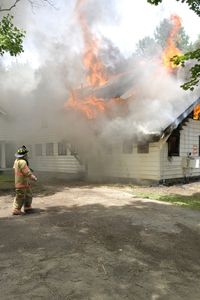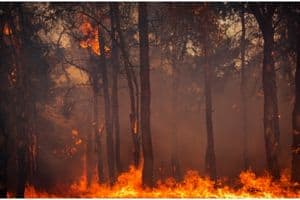You’re one of those people who always likes to be prepared for the worst-case scenario. Even if it never comes to fruition, you’re of the opinion that it doesn’t hurt to know what you would do. Keeping that in mind, could you survive a fire in a pool?

You can survive a fire by jumping into a pool, as water cannot catch on fire since it’s not flammable. In a cold pool, you’d want to gather near others to generate body heat. You’d also want to stay nearer the center of the pool to avoid falling debris and actively burning objects.
In this article, we’ll talk about whether being in a swimming pool when there’s an active fire in the vicinity is the best option. If you ever find yourself in a unique scenario such as this, then the pointers in this article could help you someday. Keep reading!
Note: It is always best to contact 911 in the event of an emergency and evacuate the area as quickly and safely as possible.
Can You Survive a Fire in a Pool?
Imagine this scenario. Your home is engulfed in flame. Perhaps a wildfire has broken out in your neighborhood.
You didn’t have time to evacuate. Rescue services cannot reach you right now because the fire is still burning, and quite fervently at that.
You’re outside of your home, but you’re not sure where to go. It doesn’t seem safe to drive off, especially if you’re in the vicinity of a wildfire.
There’s a pool in your backyard or your next-door neighbor’s backyard. Could jumping in save your life?
Possibly, yes!
A Los Angeles Times article from 2017 reported on this very specific scenario. John and Jane Pascoe of Santa Rosa, California were watching as their home and the adjacent homes in their area caught on fire.
They decided to jump into their neighbor’s pool, where they stayed for six hours.
It wasn’t just the act of jumping in the pool alone that saved John and Jane. It was how they handled the entire situation.

For example, they had the foresight to cuddle together to stay warm.
However, they weren’t holding one another, which would have prevented one of them from seeing incoming perils such as falling debris. Instead, they stood back to back.
They also wore their shirts over their faces so they weren’t breathing in too much smoke nor getting too close to the embers that were landing on the surface of the water.
And then they waited. As we mentioned, John and Jane were in the pool for six hours. The air temperature a cold 55 degrees Fahrenheit, and the water temperature could have been lower than that even with the flames about.
Not helping matters was that both John and Jane were half-naked, as they had used their own clothing to protect themselves, as we mentioned.
When the worst of the firestorm had passed, the two got out of the pool. They survived due to their quick thinking.
Now, while this is an extraordinary story with a happy ending, we must note that several factors worked out in John and Jane’s favor.
- John and Jane had a swimming pool in the vicinity. They live in California where pools are a lot more prevalent. In a state like Nebraska, you won’t see many swimming pools around. That disqualifies jumping into a pool as a way to survive the fire.
- The pool was open. The wildfire referred to in the Los Angeles Times article occurred in October 2017. For most parts of the country, swimming pools are long since closed by the fall. Using a pool with a cover on it for fire protection wouldn’t work, as it would take too long to take off the cover.
- Although 55 degrees is chilly, and hypothermia can occur in water temps under 70 degrees, John and Jane were at less risk of hypothermia than if someone was in a pool that’s 30 degrees or lower. Then you’d have to choose between burning in a fire or freezing in a pool.
- The pool was shallow throughout, only reaching depths of four feet. Most swimming pools have a dedicated shallow end and a deep end. Being in the deep end would be harder to navigate, especially in the dark with all sorts of debris floating in the pool. Further, there was no need to swim or tread water, nor hang onto the edges of the pool where debris could have fallen.
- John and Jane presumably knew how to swim. If you don’t, then jumping into a pool of any depth is not smart, even to escape a fire.
What Should You Do If There’s a Fire?
When a fire starts on your property or on the premises, it’s easy to panic. You worry about all your earthly possessions going up in flames. You stress about getting your family out as well as beloved household pets.
Although you’ll want to lose your wits, you mustn’t. Instead, here’s how you should handle a fire.
Evacuate Immediately
In the case of John and Jane, their daughter called them before the firestorm raged and mentioned that a fire was burning 40 miles away. The couple, used to fires as California residents, decided not to leave at that time.
By the time they tried to evacuate several hours later, the roads were burning, and the couple couldn’t get out.

Use their cautionary tale as an example of what not to do. As soon as you smell smoke or see fire, get out of the house immediately.
Gather up as much as what you can, but don’t waste needless time. It takes a house today about five minutes to burn, so the clock is already ticking.
The lives of yourself and your family members matter more than possessions.
Get Away from the Fire
Once you and your family members have evacuated, get a far distance away from your house. This way, if combustion occurs or the fire suddenly spreads, your loved ones should be far enough away that they’re unaffected.
Contact Emergency Services
Next, dial 911 or whatever your emergency number equivalent is. Calmly explain your situation to the dispatcher. They’ll send the local fire department to your home.
Wait for Emergency Services to Arrive
In the meantime, stand by where you are (and if you’re not safe, then please, get to safety) until the firefighters arrive.
Never try to extinguish a fire yourself, as you could put yourself in mortal danger. Do not go back into the house for any reason either.
Once the fire department is on the scene, they’ll begin extinguishing the fire. If you and your family need medical attention (which is likely), you’ll be transported to the closest medical center.
When a fire breaks out on your premises, sometimes jumping into a swimming pool can be a means of survival. That said, we only recommend this if you absolutely cannot evacuate. Otherwise, evacuation is always best.
Remember to create warmth, go underwater for fresh air periodically, and protect yourself from falling debris if you ever do have to take shelter in a swimming pool during a fire. Don’t stay in the pool longer than you have to!